The Nicolaitans, mentioned in Revelation 2:6 and 2:15, originate from Nicolas of Antioch, one of the seven deacons. They symbolize a dangerous twist in early Christian teachings, promoting immoral practices and conformity to pagan customs. Early church leaders condemned their teachings, associating them with antinomianism, which misinterpreted grace to justify sin. Their influence, particularly in Ephesus and Pergamum, created significant challenges for early Christians trying to maintain their faith against societal pressures. Understanding their impact is crucial in recognizing early church struggles, so you might find it interesting to explore their complexities further.
Key Takeaways
- The Nicolaitans are linked to Nicolas of Antioch, one of the seven deacons mentioned in Acts 6:5.
- They are condemned by Jesus in Revelation 2:6 and 2:15 for promoting immoral practices.
- The Nicolaitans' teachings encouraged antinomianism, misinterpreting grace to justify sin and idolatry.
- Early church leaders warned against Nicolaitan influences, emphasizing the need for doctrinal integrity.
- Their practices reflected broader challenges faced by early Christians in a pagan society.
Introduction
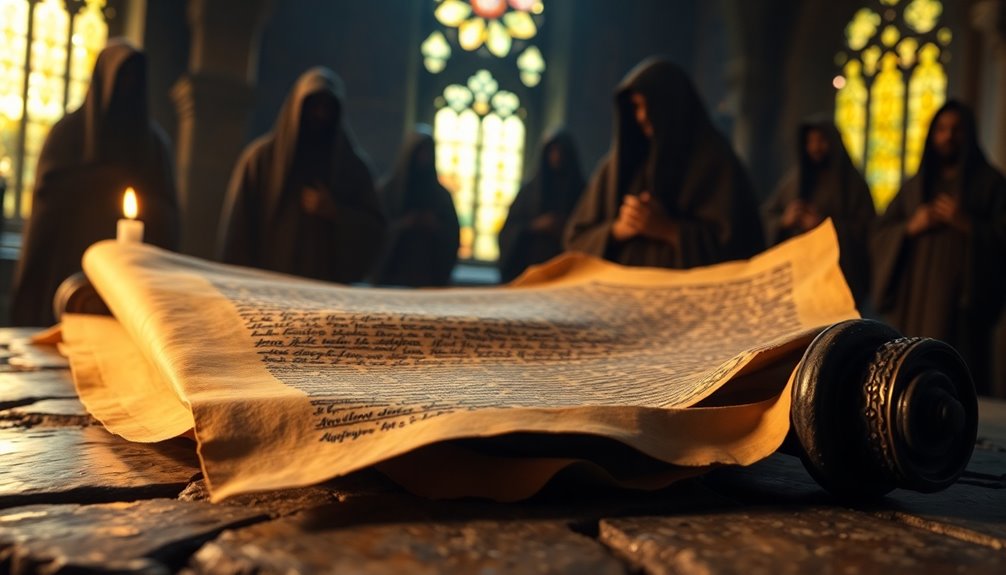
Understanding the Nicolaitans is crucial for grasping the early challenges faced by the Christian church. Mentioned in the Book of Revelation, specifically in Revelation 2:6 and 2:15, Jesus expresses His disdain for their deeds, which posed a significant threat to early Christian doctrine.
Historically, these Nicolaitans are linked to Nicolas of Antioch, one of the seven deacons appointed in Acts 6:5. It's believed he fell into heretical teachings that promoted moral compromise.
The term "Nicolaitans" comes from the Greek words "nikos" (victory) and "laos" (people), indicating their role as "conquerors of the people." This influence led many believers astray, particularly in Ephesus.
Their teachings endorsed the doctrine of Balaam, which encouraged idolatry and sexual immorality, practices condemned by early church leaders and in scriptural warnings.
The Nicolaitans misinterpreted grace, promoting a dangerous antinomianism that allowed indulgence in sin while undermining the moral integrity of the Christian community.
Recognizing the impact of the Nicolaitans helps you understand the broader context of the challenges faced by early Christians as they sought to uphold their faith against such misleading influences.
Biblical References to Nicolaitans
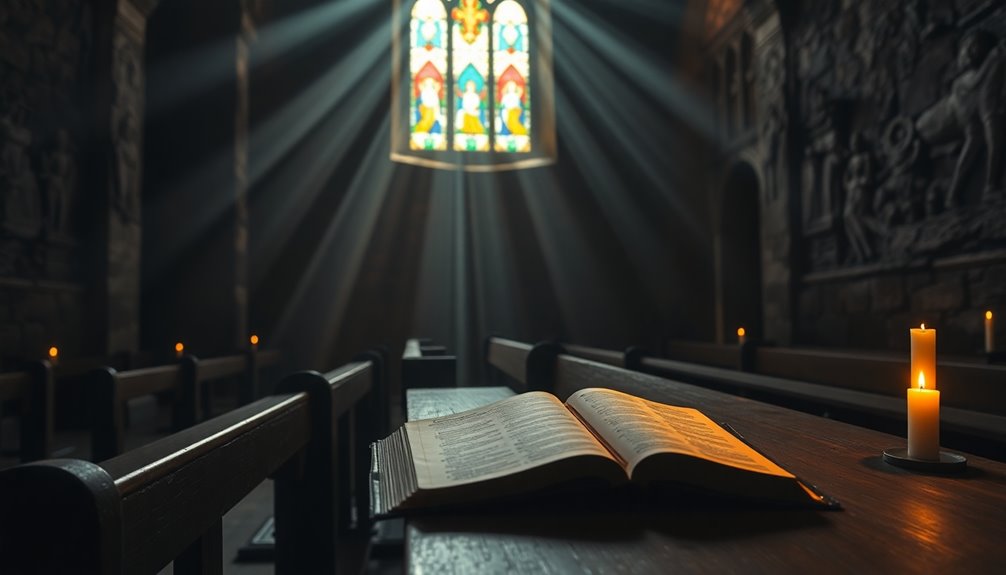
When you explore the biblical references to the Nicolaitans, you'll find significant mentions in Revelation, particularly regarding their immoral teachings.
The churches of Ephesus and Pergamum faced challenges related to these practices, which are also echoed in other New Testament writings.
Understanding these passages will help you grasp the gravity of the Nicolaitans' influence and the early church's response.
Primary Bible References
References to the Nicolaitans in the Bible primarily appear in the Book of Revelation, where their practices and teachings are met with strong condemnation. In Revelation 2:6, the church in Ephesus is praised for hating the deeds of the Nicolaitans, showing that their actions were viewed unfavorably.
Moving to Revelation 2:14-15, Jesus warns the church in Pergamum about the Nicolaitans' teachings, which include idolatry and sexual immorality. These practices are linked to the doctrine of Balaam, who led the Israelites into similar sins, as highlighted in Revelation 2:14.
Furthermore, Revelation 2:16 calls for repentance from anyone promoting Nicolaitan teachings, underscoring the seriousness of their influence on the church.
The concern over the Nicolaitans extends beyond Revelation, with 2 Peter 2:15 connecting them to destructive and immoral behavior. Jude 1:4 also issues a warning against their licentiousness, emphasizing the danger they pose.
Together, these references illustrate the Nicolaitans' significant impact on early Christian communities and the urgent need for adherence to true teachings.
Secondary Bible References
The Nicolaitans' influence on early Christian communities extends beyond the primary references found in Revelation. In Revelation 2:6, the church of Ephesus is praised for detesting their deeds, which Jesus also condemns. Conversely, in Revelation 2:14-15, the church of Pergamum faces criticism for tolerating Nicolaitan teachings that promoted idolatry and sexual immorality, echoing the actions of Balaam.
Further references in 2 Peter 2:15 and Jude 1:4 associate the Nicolaitans with destructive heresies and the distortion of grace, warning against their influence. The name "Nicolaitans" stems from the Greek words "nikos" (victory) and "laos" (people), suggesting their role as "conquerors of the people," which highlights their impact on early church dynamics.
Early Church leaders, including Irenaeus and Hippolytus, documented the Nicolaitans as heretics, emphasizing the threat they posed to the moral integrity of the early Christian community. Their teachings not only challenged foundational Christian beliefs but also encouraged practices that contradicted the very essence of faith in Christ, ultimately urging followers to remain vigilant against such influences.
Early Christian Sects' Influence
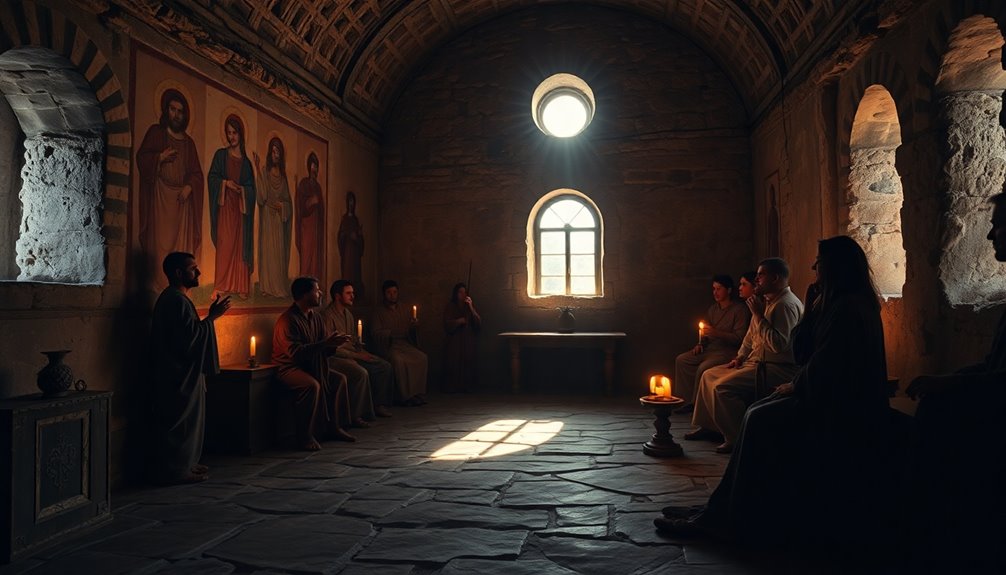
Some early Christian sects, like the Nicolaitans, significantly influenced the development of church doctrine and practices. The Nicolaitans were identified in Revelation for promoting teachings that conflicted with early church beliefs, particularly those endorsing idolatry and sexual immorality. This heretical group misrepresented Christian teachings, using the concept of grace to justify indulgent behavior, which threatened the moral integrity of the church.
Their link to Nicolas of Antioch, a deacon mentioned in Acts 6:5, adds complexity to their origins. Misinterpretations of his actions were exploited to promote immoral practices. The Nicolaitans' teachings often echoed the doctrine of Balaam, which emphasized compromising Christian beliefs with pagan customs. This was especially relevant as early Christians faced societal pressures and persecution.
Early church responses varied significantly. For instance, churches in Ephesus actively opposed Nicolaitan practices, resisting their influence, while others, like Pergamum, faced criticism for tolerating these teachings.
This ongoing struggle for doctrinal purity highlights the challenges early Christians encountered as they sought to uphold their faith amid competing ideologies and moral dilemmas.
Historical Context of Nicolaitans

Understanding the historical context of the Nicolaitans sheds light on their emergence as a significant challenge to early Christianity. Mentioned in Revelation 2:6 and 2:15, the Nicolaitans posed a threat to the early church's doctrinal purity. They're believed to be followers of Nicolas, a deacon from Acts 6:5, whose teachings were possibly misinterpreted to justify immoral behaviors.
According to early Church writers like Irenaeus and Eusebius, the Nicolaitans were heretics who blended Christian beliefs with pagan practices, promoting idolatry and sexual immorality. This fusion of faith and local customs made it difficult for early Christians to remain steadfast in their beliefs.
The Nicolaitans' name, derived from the Greek words "nikos" (victory) and "laos" (people), reflects their deceptive influence as "conquerors of the people."
Operating within a pagan context, the Nicolaitans exploited societal pressures, encouraging early Christians to conform to local idol worship. As a result, the early church had to navigate these challenges carefully, striving to maintain doctrinal purity while confronting the Nicolaitans' seductive teachings.
Their presence highlights the complexities faced by early believers in a world steeped in idolatry.
Misunderstandings About Nicolaitan Practices
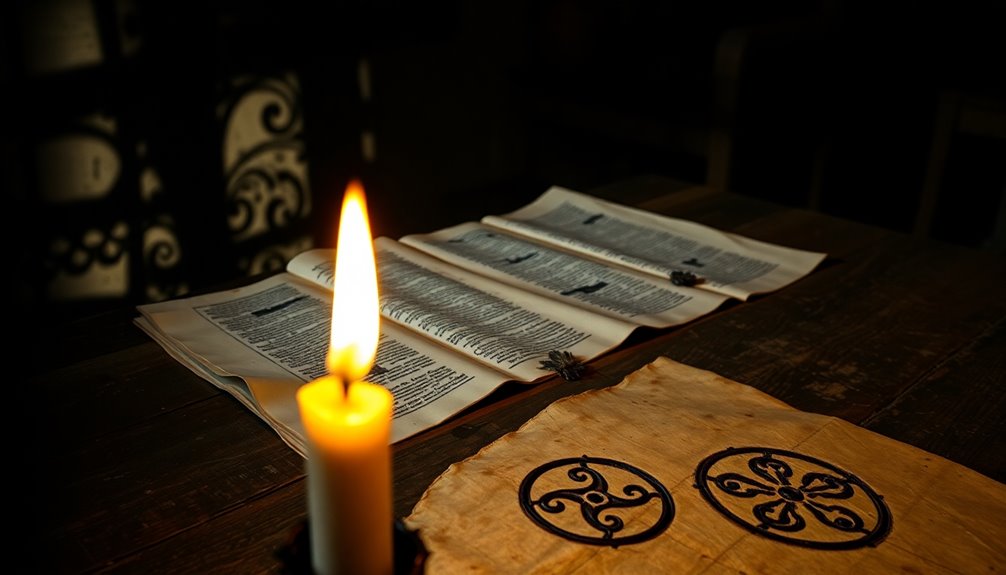
You might think the Nicolaitans were a single, unified group, but they actually reflected a wider trend of antinomianism in early Christianity.
Many misconceptions arise from misinterpreting their practices as a blanket endorsement of immorality, rather than recognizing their twisted take on Christian liberty.
Debunk Common Nicolaitan Misconceptions
Many misconceptions linger about the Nicolaitans and their practices. Many people think of the Nicolaitans as mere indulgent libertines, but that's a simplification. Their teachings stemmed from a twisted interpretation of grace that permitted immorality and idolatry, which Jesus explicitly condemned in Revelation 2:6 and 2:15. This misunderstanding overlooks the broader trend of antinomianism they represented, a challenge still relevant in Christian doctrine today.
Some might link the Nicolaitans to Gnostic thought. However, early church fathers like Eusebius clarified that their misrepresentations arose from a distortion of Nicolas of Antioch's original teachings. The Nicolaitans are often associated with sexual immorality and idol worship, supported by biblical references in Revelation and 2 Peter 2:15. These texts illustrate how they led believers away from true faith.
Misconceptions about the Nicolaitans also ignore the historical context of early Christianity grappling with a pervasive pagan culture. This environment influenced their beliefs and practices, resulting in a compromised faith that the scriptures warned against.
Misinterpretation of Scripture Context
Misinterpreting Scripture context has led many to misconceive the practices of the Nicolaitans. They distorted Christian teachings, promoting the idea that actions like idolatry and sexual immorality were inconsequential due to their understanding of grace. This misinterpretation resulted in a troubling view of moral accountability, allowing them to justify eating food sacrificed to idols and engaging in immoral acts.
Early church leaders, such as Irenaeus and Clement of Alexandria, recognized the dangers of Nicolaitan practices, labeling them as heretical. They drew parallels between the Nicolaitans and Balaam, who seduced the Israelites into sin, highlighting a historical pattern of doctrinal misinterpretation.
Jesus' strong condemnation of Nicolaitan practices in Revelation underscores the seriousness of their deviations from true doctrine. Their actions weren't merely personal choices; they undermined the integrity of the early church and distorted foundational teachings of Christ.
This underscores the importance of understanding Scripture context, as misinterpretations can lead to destructive beliefs that threaten moral accountability and the church's unity. Recognizing the Nicolaitans' misinterpretations helps us appreciate the true teachings of the faith.
Community Accountability Measures
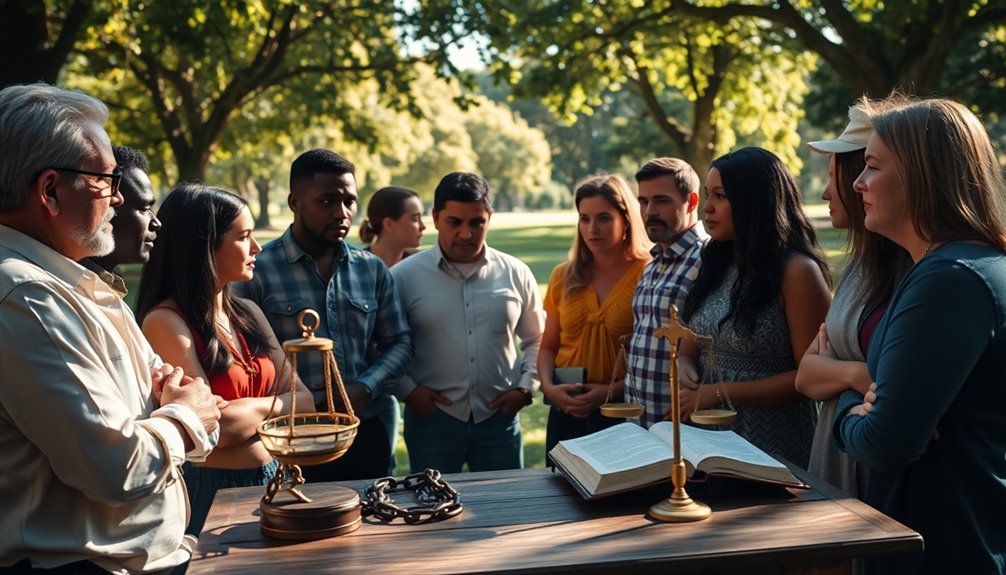
When it comes to community accountability, self-reflection on your moral choices is crucial.
Participating in ethical decision-making workshops can help you sharpen your discernment and strengthen your commitment to biblical standards.
Together, these practices foster a supportive environment where everyone can hold each other accountable and resist negative influences.
Self-Reflection on Moral Choices
Reflecting on our moral choices is crucial, especially within the context of community accountability measures. The Nicolaitans serve as a stark reminder of the dangers of indulgence and moral compromise. When you engage in self-reflection, you can better assess how your decisions align with biblical teachings. This process fosters moral integrity and helps uphold doctrinal purity within your community.
Regular discussions on moral dilemmas can create an environment rooted in shared values, where believers support one another in making choices that reflect their faith. By prioritizing community accountability, you encourage vigilance against teachings that may deviate from spiritual health.
Remember, the early church's response to Nicolaitan practices underscores the importance of maintaining standards that protect the community from moral decline.
Through self-reflection, you not only evaluate your own actions but also contribute to a collective effort that strengthens the faith of your community. This approach helps guard against the temptations that Nicolaitan-like mindsets can present.
Ultimately, your commitment to moral choices and accountability can lead to a more profound spiritual growth, both individually and collectively.
Ethical Decision-Making Workshops
Building on the importance of self-reflection, ethical decision-making workshops offer a practical approach to community accountability.
These workshops provide structured environments for you to explore the implications of Nicolaitan teachings and their parallels to modern moral dilemmas. Through case studies, you'll see the consequences of compromising ethical standards, much like how the Nicolaitans blended pagan practices with Christianity.
Engaging in reflective discussions encourages a deeper understanding of biblical principles, emphasizing the significance of maintaining doctrinal purity, just as early churches were warned against Nicolaitan influences.
You'll participate in role-playing scenarios that help you practice making decisions aligned with your values, reinforcing the need for discernment in the face of teachings that promote immorality.
Nicolaitans' Impact on Early Christianity

The Nicolaitans significantly impacted early Christianity by challenging the moral and doctrinal foundations of the faith. Linked to Nicolas of Antioch, this heretical group promoted practices that led to idolatry and sexual immorality, creating significant struggles within church communities. Their teachings blended Christian beliefs with pagan practices, which threatened the doctrinal purity that early Christians sought to uphold.
Church leaders like Irenaeus and Tertullian condemned the Nicolaitans, viewing their influence as a major threat to the integrity of the faith. This group's promotion of antinomianism rejected the moral law, encouraging believers to indulge in sinful behaviors under the guise of grace. Such a mindset put early Christians in a precarious position, as they'd to navigate societal pressures that sought to dilute their beliefs.
Jesus' strong disapproval of Nicolaitan practices underscored the importance of spiritual discernment. Early Christians needed to remain vigilant, recognizing the dangers of compromising their values. By resisting the Nicolaitans' enticing yet destructive teachings, they worked to preserve the essence of their faith, ensuring that the core tenets of Christianity would endure against external influences.
Additional Resources

To better understand the Nicolaitans and their influence on early Christianity, you can explore a variety of resources that offer insights into their teachings and the church's response.
Start by examining the biblical passages in Revelation 2:6 and 2:15, where Jesus condemns their deeds, shedding light on the early church's struggles with immorality.
Historical accounts link the Nicolaitans to Nicolas of Antioch, a deacon mentioned in Acts 6:5, who reportedly fell into heretical teachings.
Early church fathers like Irenaeus and Tertullian provide documentation on how the Nicolaitans promoted antinomianism, distorting grace to justify indulgent lifestyles. Their teachings led to serious concerns about spiritual compromise, emphasizing the need for doctrinal purity.
Consider reading scholarly articles or books that delve deeper into the context of these teachings and their implications for the early church.
You might also find value in commentaries that analyze the significance of the Nicolaitans in Revelation.
Frequently Asked Questions
What Did the Nicolaitans Believe?
The Nicolaitans believed in a doctrine that mixed core beliefs with more permissive practices.
They thought it was okay to indulge in activities like sexual immorality and eating food offered to idols, claiming grace made these actions inconsequential.
By justifying this behavior, they encouraged a lifestyle that blurred the lines between faith and worldly practices.
Their approach posed a significant threat to maintaining moral integrity within the community of believers.
What Were the Nicolaitans Doing That God Hated?
You'll find that the Nicolaitans engaged in practices that led to moral compromise and spiritual corruption.
They promoted idolatry and sexual immorality, encouraging others to indulge in behaviors that contradicted fundamental teachings of faith.
Their doctrine twisted the concept of grace, allowing for a lifestyle of excess and self-gratification.
This blatant disregard for spiritual integrity and purity was something God absolutely hated, as it threatened the very essence of a faithful community.
Who Are the Nicolaitans Mentioned in Revelation 2 6 14 15?
The Nicolaitans were a group that emerged in the early Christian community, often associated with controversial teachings and practices.
You'd find them promoting ideas that blurred moral boundaries, leading to significant debates within the church. Their influence raised concerns about doctrinal purity, and many viewed them as a threat to the community's integrity.
Understanding their actions helps you grasp the challenges faced by early believers in maintaining their faith and values amidst conflicting perspectives.
What Does the Word Nicolaitans Mean in the Bible?
The word "Nicolaitans" comes from Greek roots, where "nikos" means victory and "laos" means people.
So, it can be interpreted as "conquerors of the people." This term suggests a group that sought to dominate or lead others, often through questionable practices.
Their name hints at a blend of authority and moral compromise, raising concerns about how they influenced followers and led them away from true beliefs.
It's all about understanding their impact on the community.










